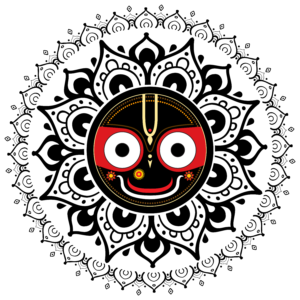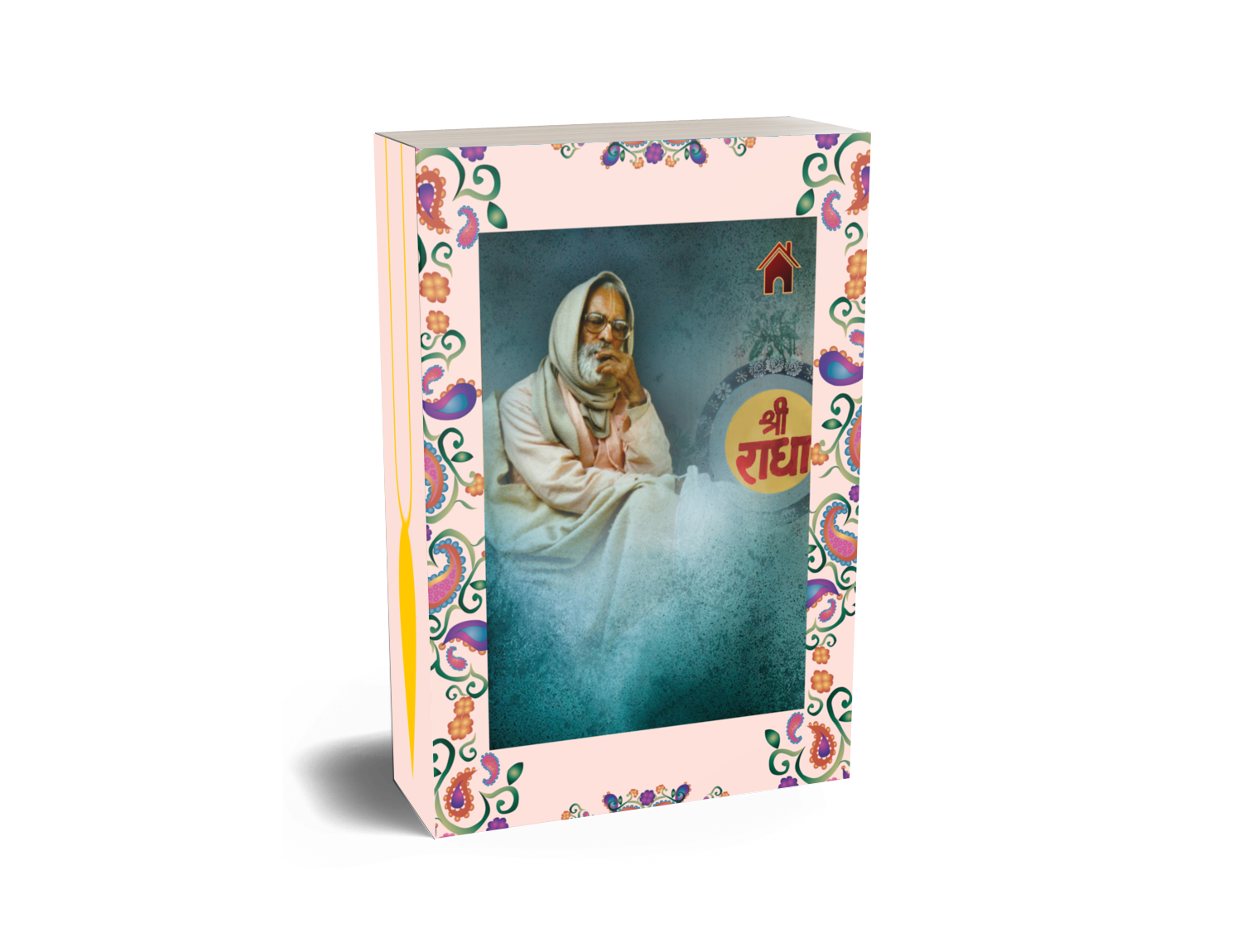
 [The following was taken from notes written during Śrīla Bhaktivedānta Nārāyaṇa Mahārāja’s talk, spoken partly in English and partly in Hindi in Auckland, New Zealand on January 12, 2001. A close relative of the devotee hosting Śrīla Bhaktivedānta Nārāyaṇa Mahārāja came for darśana. Śrīla Bhaktivedānta Nārāyaṇa Mahārāja joked with him and told him not to come to his darśanas or classes because he would then give up his home and family, and take sannyāsa. Then he said:]
[The following was taken from notes written during Śrīla Bhaktivedānta Nārāyaṇa Mahārāja’s talk, spoken partly in English and partly in Hindi in Auckland, New Zealand on January 12, 2001. A close relative of the devotee hosting Śrīla Bhaktivedānta Nārāyaṇa Mahārāja came for darśana. Śrīla Bhaktivedānta Nārāyaṇa Mahārāja joked with him and told him not to come to his darśanas or classes because he would then give up his home and family, and take sannyāsa. Then he said:]
Here in New Zealand we’ll give tattva with the help of sweet pastimes, and thus very easily they will understand.  It will be like the kindergarten system. The pastimes of Kṛṣṇa are so powerful that even a spiritually blind person will become like the great personalities of the past and take sannyāsa.
It will be like the kindergarten system. The pastimes of Kṛṣṇa are so powerful that even a spiritually blind person will become like the great personalities of the past and take sannyāsa.
In 1933, Śrīla Bhaktivedānta Svāmī Mahārāja took initiation. He was doing his business, managing a chemical company, but he was also reading Śrīmad Bhāgavatam. While reading he saw a śloka:
śrī-bhagavān uvāca
yasyāham anugṛhṇāmi
hariṣye tad-dhanaṁ śanaiḥ
tato ’dhanaṁ tyajanty asya
svajanā duḥkha-duḥkhitam
Śrīmad-Bhāgavatam 10.88.8
“The Personality of Godhead said, ‘If I especially favour someone, I gradually deprive him of his wealth. Then the relatives and friends of such a poverty-stricken man abandon him. In this way he suffers one distress after another’.”
Śrīla Svāmī Mahārāja told me when he took sannyāsa, “I remember the days just after Śrīla Pradhupāda gave  me initiation; I chanted with taste and eagerness. Then I saw a śloka: ‘If anyone remembers me from the core of his heart, I take away all his possessions, home, and family, and make him a street beggar.’ Still, I had so much taste for chanting, and I continued. After some time my wife left me and my three sons also left. They called me a ‘bogus father,’ and they left he who had been working so hard for them. Then, when my medical company failed, I made a big shop, and even the prime minister used to come there. Unfortunately that also failed, but still I did not give up. I became my own medical representative. I made my own medicine and brought it to the other shopkeepers. But that also failed. Now I have come to you penniless. I have not one paisa.”
me initiation; I chanted with taste and eagerness. Then I saw a śloka: ‘If anyone remembers me from the core of his heart, I take away all his possessions, home, and family, and make him a street beggar.’ Still, I had so much taste for chanting, and I continued. After some time my wife left me and my three sons also left. They called me a ‘bogus father,’ and they left he who had been working so hard for them. Then, when my medical company failed, I made a big shop, and even the prime minister used to come there. Unfortunately that also failed, but still I did not give up. I became my own medical representative. I made my own medicine and brought it to the other shopkeepers. But that also failed. Now I have come to you penniless. I have not one paisa.”
I therefore requested Śrīla Svāmī Mahārāja, “Come to Keśavajī Gauḍīya Maṭha. We’ll serve you. You are the very dear friend of my Gurudeva, so there is no need to take his permission.” Soon my Gurudeva came and also requested him, “You are so qualified. You should take sannyāsa and be jagad–guru and preach all over the world.”
So this hari-kathā is very powerful. However, if there is vaiṣṇava-aparādha, there will be no fruit. We should be careful about these offences.
Once, there was an argument between the co-wives of Kaśyapa Muni. Their names were Kadrū and Vinatā. Vinatā said, “The sun has a human form. That sun-god sits on a chariot and that chariot is pulled by white horses with shining white tails.” The queens were at that time not seeing the chariot clearly. Kadrū knew that the horses’ tails were white, but just to be contradictory she said they were black. Kadrū told Vinatā “If I am right, then you will have to become my maidservant, and if you are right, then I’ll become your maidservant.” The two co-wives then arranged to see the chariot better, when the sun would be more clearly visible.
Kadrū was the mother of snakes. She told her sons, who were black cobras, “I do not want to be a maidservant. Go to the horses before sunrise, and cover their tails with your bodies so that I do not lose.” Her sons flew into the sky and covered the tails. When Kadrū and Vinatā later saw the horses, the tails were black, and Vinatā was bound to become the maidservant of Kadrū.
At that time Vinatā was pregnant and she later gave birth to Garuḍa. When he was somewhat grown, Garuḍa  realized that his mother was a maidservant, and he wept. He inquired from her how she had become so, and asked if there was a way for her to be freed. Vinatā told her son how she had lost a bet, and her freedom would come only if she would give Kadrū a kalaśa, a jar, of heavenly nectar.
realized that his mother was a maidservant, and he wept. He inquired from her how she had become so, and asked if there was a way for her to be freed. Vinatā told her son how she had lost a bet, and her freedom would come only if she would give Kadrū a kalaśa, a jar, of heavenly nectar.
That nectar was kept by Indra in Svargaloka, heaven, under lock and key. Garuḍa easily flew to Svarga and defeated the demigods. Taking the pot of nectar he returned to his home and gave it to his mother, who was then freed. On the way home he had stopped in four places to rest — Vṛndāvana, Prayāga, Haridvāra, and Ujjain. When he sat at each of these places, the air there was touched by the nectar, and some nectar also seeped through the clay pot. One of those places was Vṛndāvana. That is why, when the Kālīya serpent ‘killed’ everyone in Vṛndāvana by his poison, one tree remained alive — the tree upon which Garuḍa had sat.
But what is the real nectar? Garuḍa is an eternal servant of Lord Nārāyaṇa. His heart is a pot of nectar because 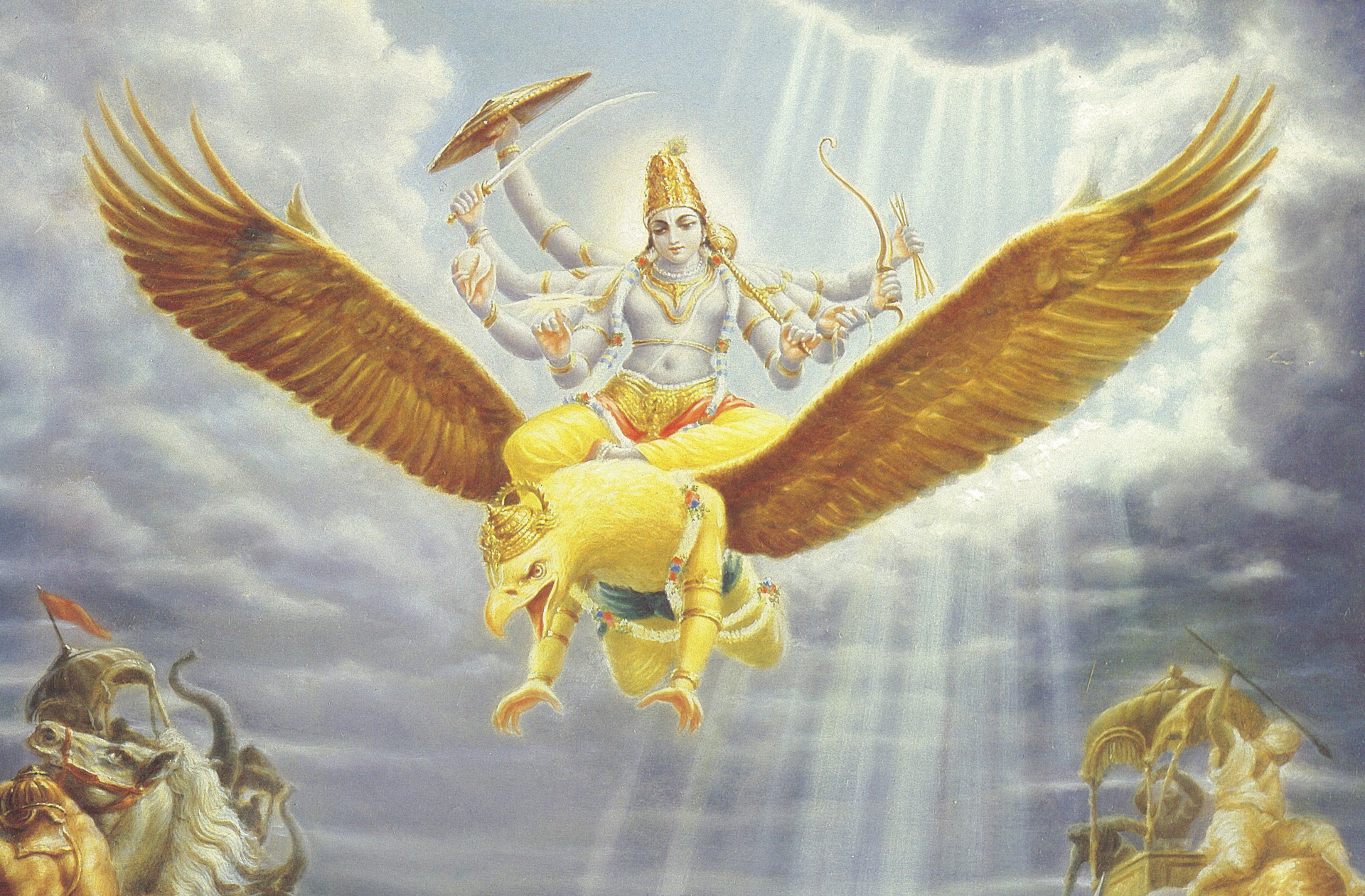 he keeps the pastimes of Nārāyaṇa there. Thus, when he sat at those places he spoke hari-kathā to the sages assembled there, like Nārada and the four Kumāras. This is nectar.
he keeps the pastimes of Nārāyaṇa there. Thus, when he sat at those places he spoke hari-kathā to the sages assembled there, like Nārada and the four Kumāras. This is nectar.
Nowadays pilgrims only go to the Ganges to take a bath, and if she is merciful, in thousands of years she may give some purity. On the other hand, sādhu-saṅga will give immediate results. By the association of Svarga your lust, problems, and pride will be increased, and you’ll be lost in false ego. However, by a high class of association, hari-kathā can give even the association of Rādhā-Kṛṣṇa Conjugal. We cannot calculate how high this is.
It is said in the śāstra that you will be liberated by taking a bath in Kumbha-melā, but this is said just to attract general people so that they may meet sādhus like Nārada Muni. Moreover, I know that what I’m telling you, you will not hear from any other sādhu.
One of the places at which Garuḍa dropped nectar was Prayāga. Every twelve years, during a certain 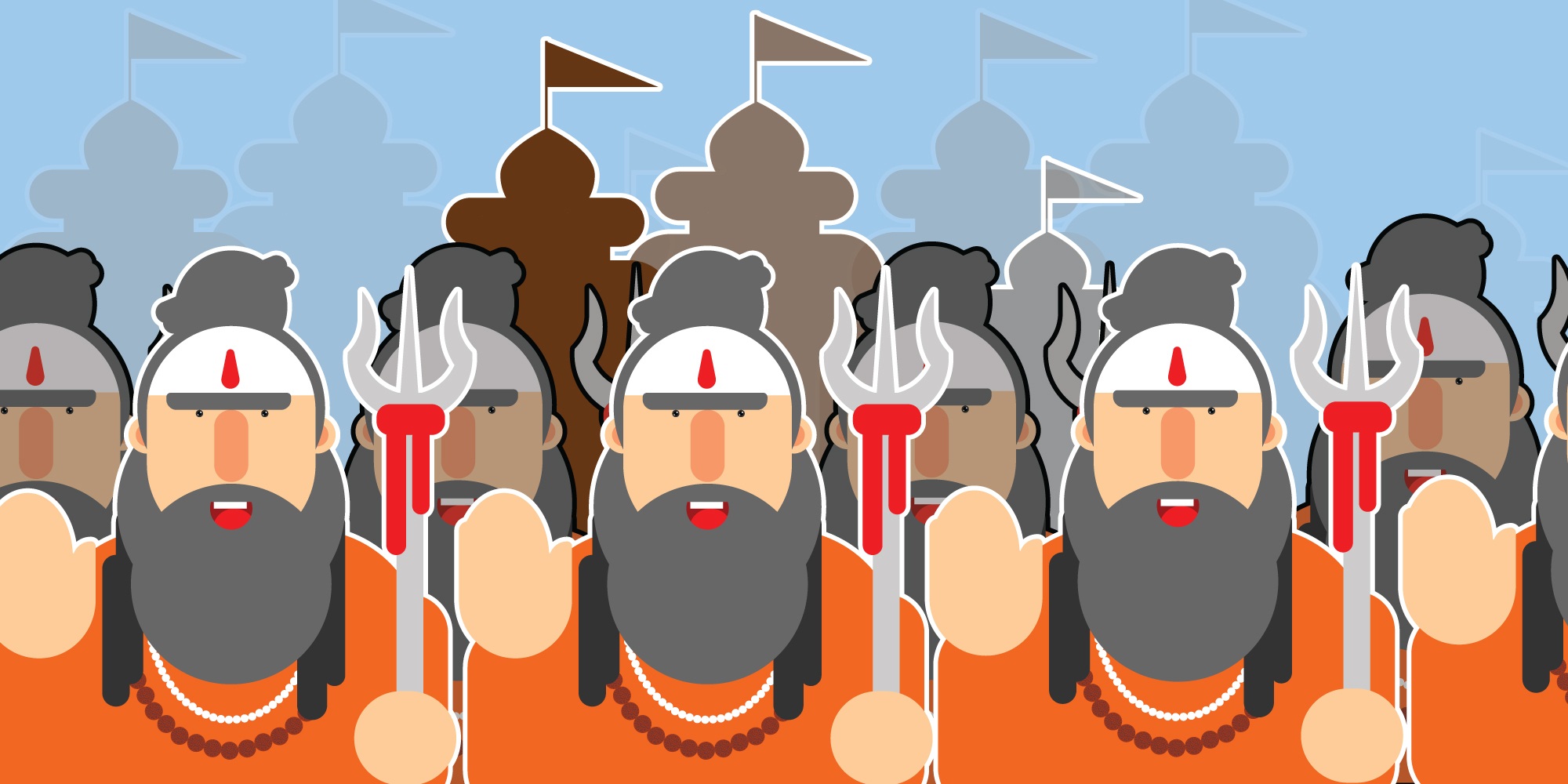 constellation, many sādhus come there and hold a melā, festival, giving talks about spiritual subjects. The Sanskrit word for clay pot is kumbha, and therefore the melā is called Kumbha-melā. The fruits of taking a bath at Kumbha-melā cannot be compared to an atom of the benefit achieved by being in Vṛndāvana.
constellation, many sādhus come there and hold a melā, festival, giving talks about spiritual subjects. The Sanskrit word for clay pot is kumbha, and therefore the melā is called Kumbha-melā. The fruits of taking a bath at Kumbha-melā cannot be compared to an atom of the benefit achieved by being in Vṛndāvana.
Once there was a great Kumbha-melā in Prayāga. Devotees, tapasvīs, jñānīs, and yogīs were all there. All the Tīrthas also came there to give presentations to Tīrtharāja Prayāga. At that time Nārada came and spoke to Tīrtharāja. He asked, “Are you Tīrtharāja, the king or greatest of all Tīrthas (holy places)? Is this the truth?” Tīrtharāja answered, “Yes.” Nārada said, “I don’t believe you. All the Tīrthas are here to present upahāra, gifts, to you, but do you see here a single tīrtha of Vṛndāvana?” Tīrtharāja looked here and there, and he could not find any tīrtha from Vṛndāvana. Even the smallest tīrtha had not come to honour him.
Nārada then said, “So how are you Tīrtharāja?”
Tīrtharāja then went to Lord Nārāyaṇa in Vaikuntha. When present before the Lord, he asked, “Why did You give me this title of Tīrtharāja? I am not Tīrtharāja.”
Nārāyaṇa replied, “Who has told you this?”
“Nārada Ṛṣi told me.”
“Oh, don’t believe him, he is a troublemaker. He is trying to trick you Don’t listen to him.”
“But his facts were true. There at Prayāga he showed me that all of the tīrthas had come to honour me, but not a single tīrtha of the caurāśi (eighty-four square miles) in Vṛndāvana was present.”
“He has tricked you. Vṛndāvana is not a tīrtha. Vṛndāvana is my heart. It is Myself. How can I give my heart to you? So really you are Tīrtharāja.”
You cannot imagine how those in Vṛndāvana can control Kṛṣṇa. Those who can follow the pālya-dāsīs of Śrīmati 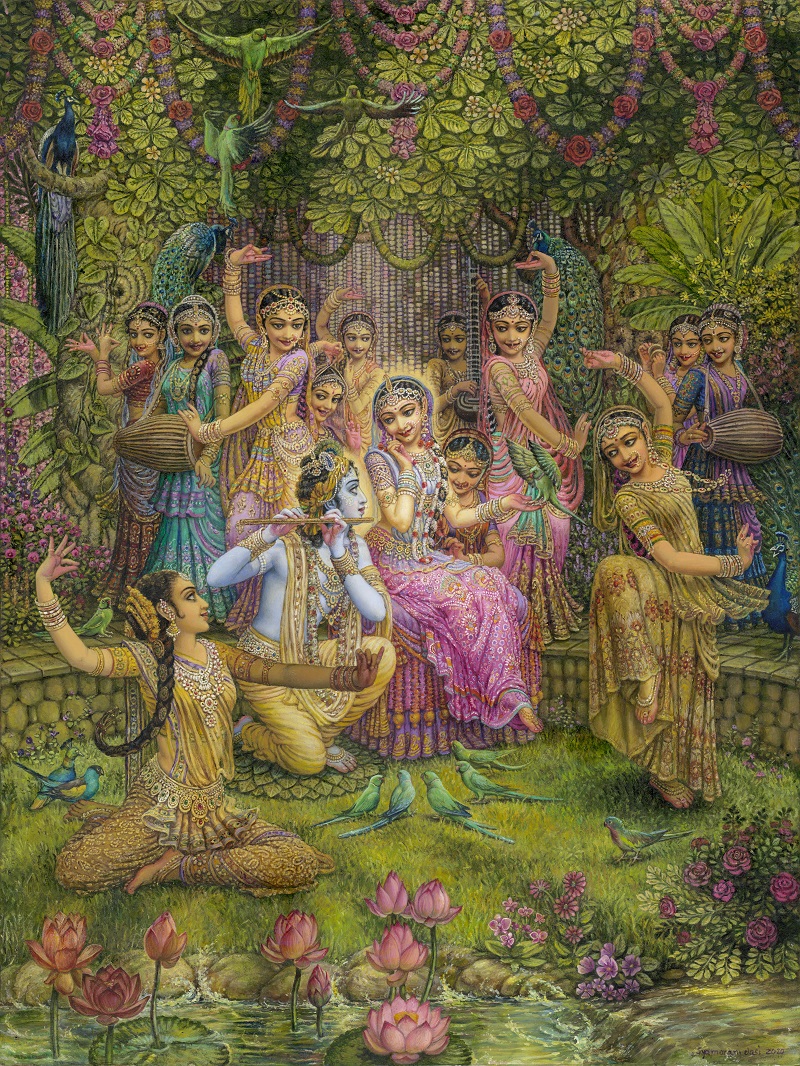 Rādhikā will never go to Prayāga. By hearing Nārāyaṇa’s pastimes and bathing in Prayāga, you can only get salvation and the fruits of your desires. The highest attainment you can receive is the service of Nārāyaṇa. But even a mosquito or a dog of Vṛndāvana will not want to be a servant of Nārāyaṇa. They will even reject being like Hanumān. They don’t even want to be like Rukmiṇī and Satyabhāmā. They don’t even want to be like the friends of Kṛṣṇa who can sleep on the same bed as Him and embrace Him. Kṛṣṇa sometimes takes them on His shoulders and He takes their prasāda remnants in His mouth. But these pālya-dāsīs won’t even take this friendship, nor even the parental love of Mother Yaśodā and Nanda Bābā. They only want to be pālya-dāsīs of Rādhikā, nothing else. If Śrīmati Rādhikā is angry at Kṛṣṇa, they will offer namaskāra to Kṛṣṇa by saying, “O You black cheater.” Garuḍa and Nārada cannot do this. So why should these high-class devotees give up Vṛndāvana? They will never go out of Vṛndāvana, and wherever they live is Vṛndāvana.
Rādhikā will never go to Prayāga. By hearing Nārāyaṇa’s pastimes and bathing in Prayāga, you can only get salvation and the fruits of your desires. The highest attainment you can receive is the service of Nārāyaṇa. But even a mosquito or a dog of Vṛndāvana will not want to be a servant of Nārāyaṇa. They will even reject being like Hanumān. They don’t even want to be like Rukmiṇī and Satyabhāmā. They don’t even want to be like the friends of Kṛṣṇa who can sleep on the same bed as Him and embrace Him. Kṛṣṇa sometimes takes them on His shoulders and He takes their prasāda remnants in His mouth. But these pālya-dāsīs won’t even take this friendship, nor even the parental love of Mother Yaśodā and Nanda Bābā. They only want to be pālya-dāsīs of Rādhikā, nothing else. If Śrīmati Rādhikā is angry at Kṛṣṇa, they will offer namaskāra to Kṛṣṇa by saying, “O You black cheater.” Garuḍa and Nārada cannot do this. So why should these high-class devotees give up Vṛndāvana? They will never go out of Vṛndāvana, and wherever they live is Vṛndāvana.
I have not read astrology. I only know what I’ve heard from my Gurudeva. Śrīla Pradhupāda Bhaktisiddhānta 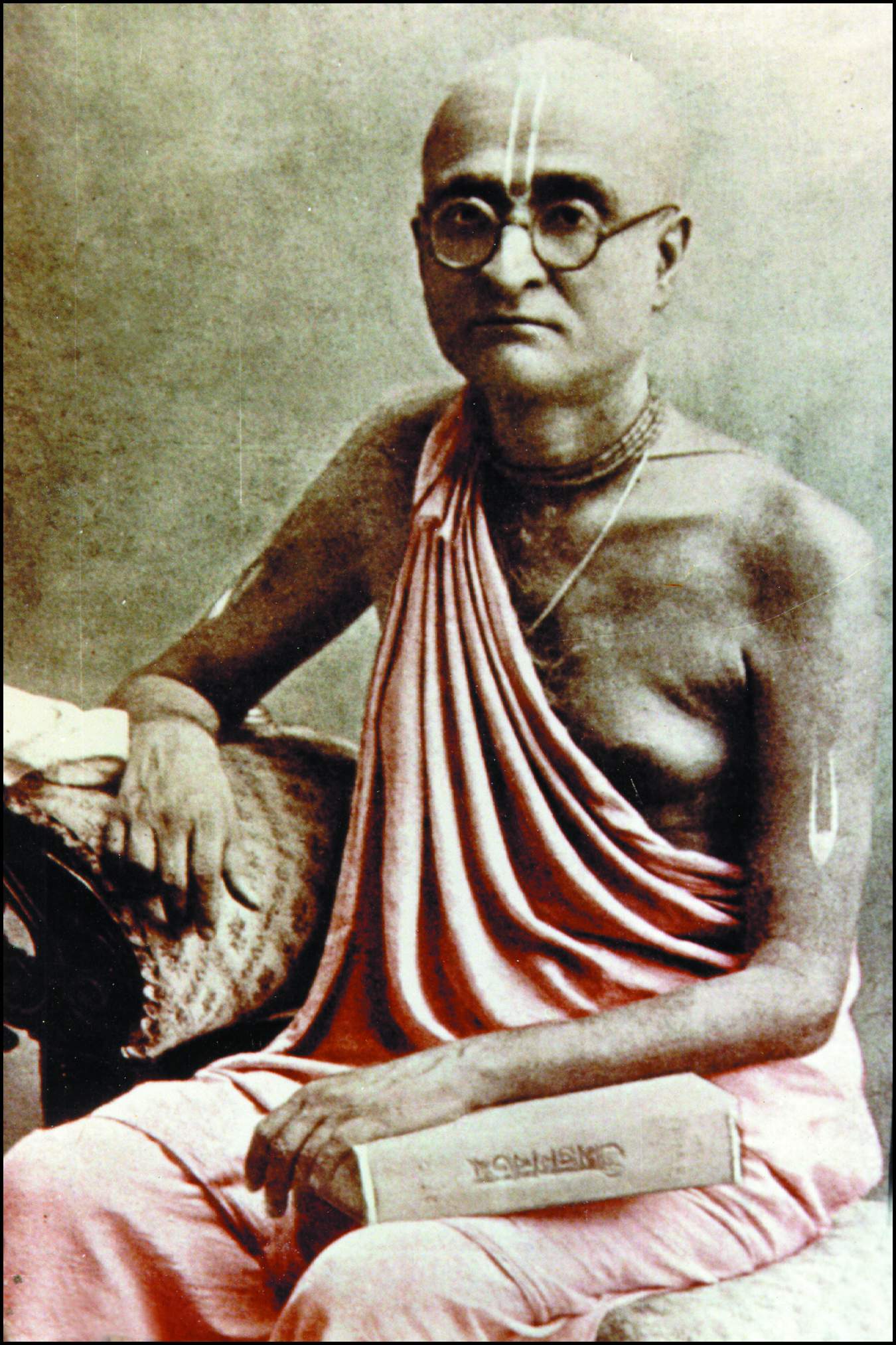 Sarasvatī was the greatest astrologer of his time. One university had an honoured chair of astrology, and they invited Śrīla Pradhupāda to come and sit in that chair. But he never cared for this position.
Sarasvatī was the greatest astrologer of his time. One university had an honoured chair of astrology, and they invited Śrīla Pradhupāda to come and sit in that chair. But he never cared for this position.
Though they (some of the ISKCON leaders) regard me, they fear that I’ll take away their disciples. They don’t know that I have not come for that. Besides that, their disciples are not their property.
If a lady is married to someone and that person is sick, then even when she is cooking for her children, she is always thinking about her husband: “What to do? What to do?” She is doing so many other things, but she is always thinking of him. Similarly, if there is a relationship with Kṛṣṇa, then gradually, although doing other things, you will always think of Him.
Source: Purebhakti.com
Image/Art made possible by Pixabay.com, Krishnapath.org and/or Bhaktiart.net
Unless indicated differently, all verse translations and quotes are from the books by Śrīla Bhaktivedānta Svāmī Mahārāja Prabhupāda (Vedabase.com)
